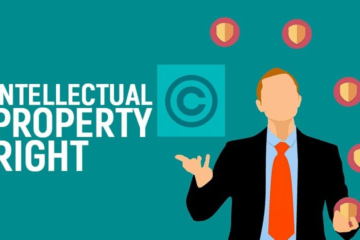
This article is written by Smriti Jha of Lloyd Law College, Greater Noida, an under Legal Vidhiya
.Abstract
Copyright is a legal privilege provided to intellectual property owners. It is the right to copy, as the phrase implies. Thus, copyright means that when someone makes a thing, they possess the right to it. As a result, only that person or anybody they authorize has the exclusive right to replicate that work.
The owner of copyrighted material makes a profit not just by exploiting it but also by sharing it with others for mutual gain. The assignment or licensing of copyright can accomplish this.
Copyright license and assignment of copyright are two distinct phrases that should not be used interchangeably.
In the case of assignment, it includes the disposal of the copyright, which means the assignor assigns the copyright to another person or transfers ownership of the copyright to another person, whereas in the case of a license, only some Intellectual Property (IP) is transferred and ownership is not transferred to the licensee.
Keywords: Copyright, Right, Authorize, Assignment, Licensing.
Introduction
Copyright is an intellectual property right granted by the law to the creator of literary, theatrical, musical, and creative work, as well as the maker of cinematograph films and sound recordings. It also applies to architectural works and computer software/programs. It can be viewed as a collection of rights that include the right to reproduce, communicate, adapt, and translate the work. Copyright protects writers’ rights to their creations and, as a result, tries to encourage creativity.
Copyright license and copyright assignment are two distinct concepts that should not be used together. In the case of assignment, it includes the disposal of the copyright, which means the assignor assigns the copyright to another person or transfers ownership of the copyright to another person, whereas in the case of a license, only some Intellectual Property (IP) is transferred and ownership is not transferred to the licensee.
A copyright assignment occurs when the owner of a copyright transfers ownership to another person or organization. [1]
Termination:
- Creator has the right to claim damages when the goodwill of the owner/creator is harmed by the omission of any act done by the assignee.
- If both parties agree to cancel the assignment.
- If the assignee does not exercise the rights assigned to him within one year of the date of the assignment, it shall be presumed to have lapsed unless otherwise specified.[2]
Difference Between Copyright Assignment and Licensing
Copyright license and assignment of copyright are two distinct phrases that should not be used interchangeably Each one is distinct in its own way. A license authorizes conduct; without it, the authorization would be considered an infringement. Licensing typically entails authorizing a subset of numerous rights. It may be exclusive or non-exclusive. In the case of assignment, it includes the disposal of the copyright, which means the assignor assigns the copyright to another person or transfers ownership of the copyright to another person, whereas in the case of a license, only some Intellectual Property (IP) is transferred and ownership is not transferred to the licensee.
A license does not give the licensee any rights against a third party or the licensor, while an exclusive licensee has significant rights against the licensor, including the right to sue the licensor.
A licensee has the freedom to make changes as long as his license does not restrict that ability. If the royalties are not paid, the licensor has the right to withdraw the license. It is not possible to do the same with the assignment. However, if there is anything unpleasant that can harm the author, it may result in revocation if a complaint is filed with the copyright board.
Unlike a copyright assignment, a copyright license must be in writing. It can be either spoken or inferred after taking into account all of the facts and circumstances surrounding the transaction between the owner of the copyright and the licensee
If an owner of a copyrighted work considers assigning the copyright, he should consider licensing it rather than transferring it. It would aid in keeping ownership and hence licensing only provides specific rights to another party.
Assignment
In the case of assignment, it includes the disposal of the copyright, which means the assignor assigns the copyright to another person or transfers ownership of the copyright to another person.
Assignment of Copyright
No one is qualified to duplicate, recreate, distribute, or offer a unique composition, painting, emotional generation, form, and so forth without the consent of the maker. As a result, the law grants the maker (creator) of the copyright the power to transfer ownership of the copyright to a third party.[3]
License
A license authorizes conduct; without it, the authorization would be considered an infringement. Licensing typically entails authorizing a subset of numerous rights
As a result, the law gives the maker (creator) of the copyright the authority to transfer ownership to a third party.
They are mentioned below:
- The time period of the license
- The rights that have been licensed
- The geographical limit or extent of the license
- The amount of royalties that will be paid as compensation.
- Clauses & Conditions pertaining to termination, modification & extension.[4]
Section 18
Assignment of copyright
Assignment of Copyright The owner of a copyright to an existing work or a future work may assign his copyright to anyone. The assignee who gets the assignment from the owner has the same rights to the copyright as the owner. The owner may put general or partial limitations on the assignee in order to enjoy shared benefits in the copyrights. However, selling a copyrighted work and surrendering the right to publish it does not constitute an assignment of copyright; rather, it is merely a publishing right.
There will be no assignments where the work did not exist at the time of copyright assignment. In the case of a future assignment of copyright, it will take effect when the work is created. When the assignee acquires the copyrights, he is treated as the copyright owner. In the event of the assignee’s death, the legal representative is entitled to the advantages of the assignment of copyright.
Section 19
Mode of assignment
Section 19 of the legislation allows for the assignment of copyright under the following conditions:
- Copyright for any work can be assigned to an assignee in writing and formally signed by the assignor or his agent.
- The copyright assignment must identify the rights assigned as well as the duration and territorial scope of the assignment.
- The copyright assignment can be changed, extended, or cancelled on mutually agreed-upon terms. The assignment must include a significant payment amount paid to the author or his legal heirs during the copyright assignment.
- If the assignee does not utilize his copyright assignment rights within one year of the date of the assignment, such rights are assumed to have lapsed.
- If not clearly stated, copyright assignment will endure up to five years.
- If not particularly stated, the assignment of copyright shall cover the entire country of India.
- Any work that violates the rules and circumstances of the assignment of copyright in the field in which the author works is void.
Section 19A
Disputes Regarding Copyright Assignment
The Appellate Board will conduct an inquiry on behalf of the party if it receives a complaint under section 19(A) of the act. If the other party fails to comply with the terms and conditions stated at the time of assignment, the Appellate Board may:
Recall the assignment.
Recovering any owed royalties
Note: The Appellate Board must issue final orders within six months of receiving the complaint. In the event of a delay, the Appellate Board shall record the grounds for the same. (According to Section 19A (3) of the Copyright Act of 1957).
Section 20
Copyright in manuscripts is transferred through testamentary disposal
Section 20 states that if a person is entitled to copyright under bequest and such work has not been published before the testator’s death, unless a contrary intention is shown in the testator’s will or any codicil thereto, such person is considered to have copyright in the work to the extent that the testator was the owner of copyright immediately before his death.
Section 21
Right of author to relinquish copyright
Section 21 of the Act gives the owner of a work the option to give up all or any of the rights in the work. As the term implies, relinquishment refers to the author’s surrender or abandonment of the rights in the copyrighted work. This usually signifies that the author’s rights have been surrendered or abandoned, and he or she can no longer claim ownership of the work. The author can choose which rights they want to relinquish.
Section 22
Term copyright in published literary, dramatic, musical, and artistic works
There are certain restrictions that must be met in order to obtain protection under the Copyright Act of 1957. These restrictions can be broadly grouped into three categories: a limited period of copyright permissible uses, non-voluntary licensing (statutory license), and statutory licenses. The duration or term of the copyright is discussed further below.
Chapter V of the Indian Copyright Act of 1957 specifies the duration of copyright protection. Section 22 of the Act provides that the term of copyright in published literary, dramatic, musical, and artistic works must survive, if published during the author’s lifetime, until sixty years after the author’s death, commencing with the first day of the calendar year following his or her death. In this section, the reference to the author shall be construed as a reference to the author who dies last in the case of a work of joint authorship. The Amendment of 1992 expanded this duration from fifty to sixty years.
In the case of a cinematograph film, sound recording, photograph, posthumous publications, or anonymous organizations, the sixty-year period begins on the date of publication.
Section 23
Copyright terms in anonymous and pseudonymous works
If the work is published anonymously, that is, when the author of the work is unknown. According to Section 23 of the Copyright Act of 1957, the copyright term of an anonymous publication is also sixty years, computed from the beginning of the calendar following the year the work was originally published. The part also allows for the author’s identity to be revealed. In its proviso, it is stated that if the identity of the author is revealed before the expiration of the abovementioned term, the copyright exists for a period of sixty years, calculated from the start of the calendar year following the year in which the work is first published.
Section 24
Term of Copyright in Posthumous Work
It is the publication of a work after the author’s death. The term of copyright protection for a posthumous publication is sixty years, and unlike in other jurisdictions, this time is computed from the date of publication.
Section 25
Term of copyright for photographs
The Indian Copyright Act grants copyright in photographs for a term of 60 years from the beginning of the calendar year succeeding the year in which the photograph is published. However, the 2012 amendment deleted this section.
Section 26
Term of Copyright in Cinematograph Films
Cinematograph Films has a copyright that lasts for sixty years from the start of the calendar year following the year in which the film is published.
Section 27
Term of copyright in sound recording
Sound recording copyright is valid for sixty years from the beginning of the calendar year following the year in which the sound recording is published.
Section 28
Term of Copyright Government works
In the event of a Government production, when the Government is the first owner of the copyright, the copyright lasts for sixty years from the start of the calendar year following the year in which the work was first published.
Section 28A
Copyright terms in works of public ventures
The copyright term in which a public undertaking is the first proprietor. When a public undertaking is the first owner of the copyright in a work, the copyright lasts for sixty years from the beginning of the calendar year following the year in which the work is first published.
Section 29
Copyright in international organization’s works
In the case of an international organization’s work to which the requirements of section 41 apply, copyright lasts for sixty years from the start of the calendar year succeeding the year in which the work is first published.
Section 30
Licenses by owners of copyright
The owner of the copyright in an existing work or in future works may give any interest in the copyright through a license. The license can be issued in writing by the owner and signed by him or an approved agent. A copyright license for any future work shall take effect only when the work is created. In the absence of any provision, the legal representative is entitled to the advantages of the license.
Application of Section 30(A)
The provisions that were applicable in section 19 in connection to the assignment of copyright, with relevant adaptations and amendments, will be applied in the event of the license granted by the owner.
Section 31
Compulsory license in works withheld from public
Section 31 of the Indian Copyright Act allows a complaint to be filed with the Copyright Board, the jurisdiction of which has now been transferred to the Intellectual Property Appellate Board when such rejection has resulted in the work being withheld from the public.
Section 31A
Section 31A deals with a compulsory license in unpublished or published works.
Section 31B
Section 31B deals with compulsory licenses for the benefit of the disabled.
Section 31C
Section 31C deals with statutory licenses for cover versions.
Section 31D
Section 31D deals with statutory licenses for the broadcasting of literary and musical works and sound recordings.
Advantages of Licensing
- It has the potential to improve marketing.
- It aids in increasing income while lowering production costs.
- It aids in the commercial expansion of a company. The licensing process makes it considerably easier to introduce work into other markets.
- Investments are relatively cheap, but there are payments in the form of royalties in return.
- Flexible in nature, as the parties have the right to make changes according to the circumstances.
Advantages of Assignment
- It contributes to increased financial advantage because the owner of the work can assign his whole ownership to a third party for a lump sum payment.
- It aids in risk mitigation and cost reduction.
- The assignment clarifies ownership in the event that many parties claim ownership.
Conclusion
Copyright protects and promotes creativity by providing some basic safeguards for writers’ rights to their works. The Copyright Act of 1957 governs the assignment and licensing of copyright in India, with distinct sections governing each procedure. Licensing is the temporary transfer of some exclusive rights to a licensee. The assignment, on the other hand, entails the permanent transfer of all or some of the exclusive rights to an assignee. Copyright holders should also meticulously document the specifics of the agreement, including any payment conditions, royalties, and performance dates.
References
- https://www.legalserviceindia.com/legal/article-142-copyright-ownership-and-assignment-of-rights. Last seen on 19/08/2023
- https://blog.finology.in/Legal-news/Copyright-Assignment-Modes-and-Termination Last seen on 20/08/2023
- https://blog.finology.in/Legal-news/Copyright-Assignment-Modes-and-Termination Last seen on 20/08/2023
- https://www.legalbites.in/category-intellectual-property-rights/copyright-assignment-and-licensing- Last seen on 21/08/2023
[1] https://www.legalserviceindia.com/legal/article-142-copyright-ownership-and-assignment-of-rights. Last seen on 19/08/2023
[2] https://blog.finology.in/Legal-news/Copyright-Assignment-Modes-and-Termination Last seen on 20/08/2023
[3] https://blog.finology.in/Legal-news/Copyright-Assignment-Modes-and-Termination Last seen on 20/08/2023
[4] https://www.legalbites.in/category-intellectual-property-rights/copyright-assignment-and-licensing- Last seen on 21/08/2023




0 Comments